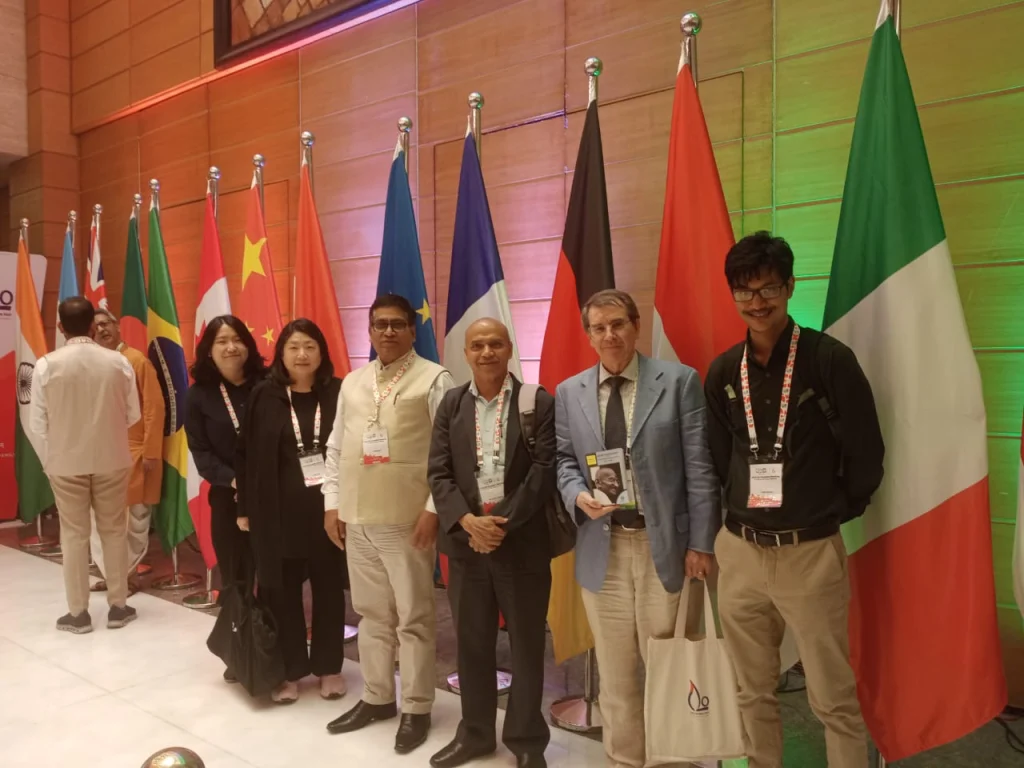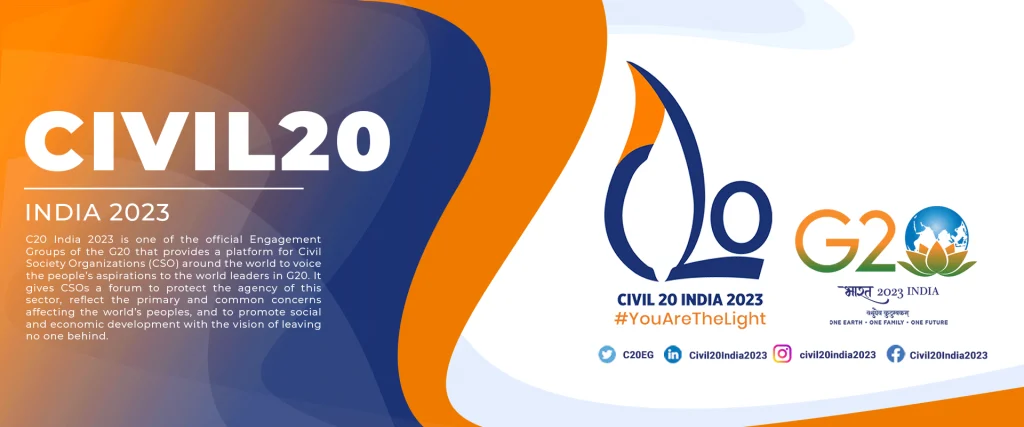20-22 March 2023| Nagpur-Delhi, India Participation in C20 Inception Meeting
The Group of Twenty (G20) is considered a premier international forum comprising the world’s leading advanced and emerging economies, representing a combined GDP of around 85% of the world’s total GDP. The G20, established in 1999, involves regular meetings between heads of state, as well as representatives from international organizations such as the International Monetary Fund (IMF) and the World Bank. While it was originally established to discuss and coordinate policies to promote global economic stability and growth, G20 has expanded to include three tracks: Finance Track (which holds meetings of mainly Finance Ministers and Central Bank Governors to discuss global macroeconomic issues), Sherpa Track (which deals with policy coordination and preparation for the G20 Leaders’ Summit), and Engagement Groups Track (which provides a platform for non-governmental stakeholders to engaged with the G20). The Engagement Groups include groups representing business, labour, think tanks, civil society, women, and youth, which are designed to provide a platform for stakeholder engagement and to ensure that the G20 process is inclusive and responsive to the needs and concerns of different groups in society. The Civil Society 20 (C20) is the official engagement group for civil society, and it works to provide policy recommendations and input to the G20 process.
The G20 Finance Track is an important platform for international economic and financial cooperation, as it brings together the world’s major economies to discuss common challenges and coordinate policies to address them. The issues of discussion include fiscal and monetary policies, financial regulation and supervision, international tax cooperation, infrastructure investment, and sustainable development. While the G20 includes a diverse set of countries with different economic systems and policy preferences, the group is often criticized for promoting a neoliberal approach to economic policy, which emphasizes free markets, liberalization of trade and investment, and limited government intervention in the economy.
Amidst the growing global economic inequality, the purpose of SAAPE’s engagement in the C20 process is to build on the ongoing campaign for the introduction and implementation of pro-poor fiscal policies, including progressive taxation, such as wealth tax policies in G20 as well as non-G20 countries, and unconditional cancellation of illegitimate debt in the global South. India holds the current G20 for the year 2023. SAAPE plans to engage in the C20 India process and provide critical inputs to the C20 Policy Pack, which will be submitted to the G20 leaders during the Summit.
SAAPE has been engaged in the C20 process since the last C20 meeting in Bali, Indonesia in 2022. Members from SAAPE Secretariat, Netra Prasad Timsina and Sudhir Shrestha, attended the C20 meeting in Nagpur, Maharastra (India) on 20-21 March 2023. They participated in the plenary sessions at the opening and closing of the programme. We are engaged in the working groups – “Sustainable & Resilient Communities: Climate, Environment and Net Zero Targets” and “SDG 16+ and promoting civic space”.

C20 Meeting Reflections
Some civil society organizations in India and beyond have raised concerns that the C20 process in India has not adequately represented their voices and perspectives, and that the process has been dominated by a small number of organizations with close ties to the government. There has been criticism that the C20 process has not adequately represented the views and interests of marginalized communities in India, such as women, LGBTQ+, and people from lower socioeconomic backgrounds.
The impression of SAAPE’s participants in the C20 meeting is that there was limited participation from trade unions, peasant organizations, and other grassroots movements; however, there were larger claims from the participants and members of the working groups that they represent grassroots organizations and CSOs. Nevertheless, there is full engagement of Troika from Indonesia and Brazil in addition to India and participants within the group (those who attended) are active in the different Working Groups. Troika from Brazil talked about the shrinking space globally and the need to expand democratic spaces, likewise the representative of the 100 million campaign also was critical to current development paradigms such as rising inequality, climate, and debt crisis, marginalization of women and children and he linked these crises as political and policy choices of the G20 countries. However, many of the other presenters argued that the spiritual dimension of development needs to be linked for a peaceful and democratic society. They argued that love and compassion are important to bring changes in the suffering of the people (politics and policies remain silent in these deliberations). According to the deliberations, it seems that there are no democratic deficits in India as many of the presenters said that India is the ‘mother of democracy’ in the world. The issue of the structural causes of poverty, inequality, discrimination, and marginalization did not surface though these are the systematic and historic problems that G20 countries need to address for even to happen ‘one earth, one family, and one future’ – the slogan of G20 2023.
Strategizing SAAPE’s engagement in the C20 process
Parallelly, LDC Watch/SAAPE, one of the co-convenors of the People’s 20 (P20), will engage with likeminded civil society organizations in India and the Global South, through its active involvement in the P20 process, to incorporate the alternative perspectives in the P20 Policy Pack to be released alongside the G20 Summit. The parallel civil society initiative, termed the People’s 20 (P20), is an unofficial forum that runs parallel to the official G20 process and seeks to bring the perspectives and concerns of ordinary citizens to the attention of G20 leaders. The P20 will issue a set of recommendations and policy pack that are presented to G20 leaders at the G20 summit.
First in-person People’s 20 meeting in Delhi, India
The first in-person meeting of the People’s 20 (P20) was held in Delhi (India) on 22 March 2023. The participants of the C20 meeting in Nagpur shared their reflections on the C20 meeting in Nagpur. The meeting discussed the need to make the P20 process complementary to the C20 process, while at the same time engaging with the C20 process by providing critical inputs to save the hard-earned achievements on the pro-poor agenda. There was further discussion on the timeline of the P20 process and the selection of organizations to lead the various thematic working groups. SAAPE agreed to coordinate the working group on “Economy and Finance” and “Poverty, livelihood and inequality” along with Tax and Fiscal Justice Alliance (TAFJA) and Global Call to Action against Poverty (GCAP). SAAPE plans to conduct events on the need for wealth taxation around May/June under the P20 process, and take the recommendations gathered from the process to the official C20 process. The People’s 20 meeting set the deadline of April 5 for the collection of inputs for the P20 Policy Pack. The PEOPLES’ 20 Declaration and Recommendations will be adopted in July, about two months before the G20 Summit (9-10 September 2023) and submitted to the G20 Secretariat 2023.



